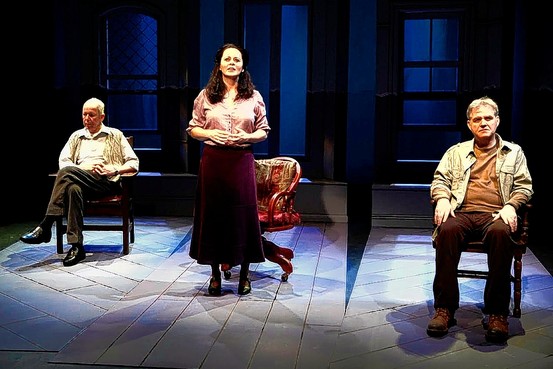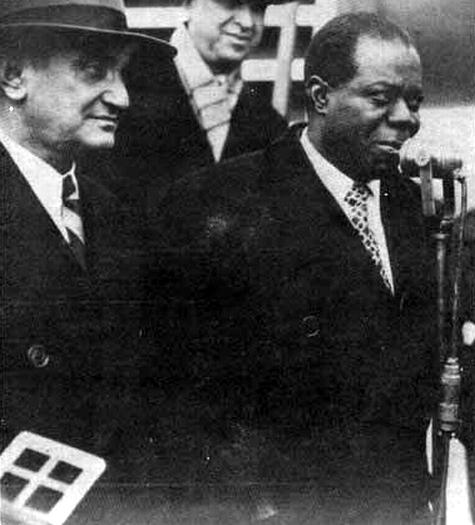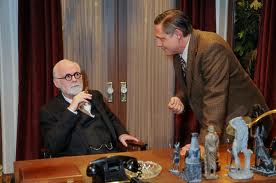In the Greater New York section of today’s Wall Street Journal, I review the Irish Repertory Theatre’s off-Broadway revival of Brian Friel’s Molly Sweeney. Here’s an excerpt.
* * *
Why is is that American productions of the works of Brian Friel, the greatest playwright of the English-speaking world, are so hard to come by? It’s been two years since I last saw one, which is far too long. So it is good news indeed that the Irish Repertory Theatre, my favorite Off-Broadway company, is performing “Molly Sweeney,” a three-person show about a 41-year-old woman who undergoes an operation to regain the sight she lost as a baby. “Molly Sweeney” is one of Mr. Friel’s most remarkable plays, yet it hasn’t been presented in New York since 1996, which I find even harder to fathom. Fortunately, this revival, staged by Charlotte Moore, the company’s artistic director, is immensely persuasive, and I have no doubt that anyone who sees it will be converted on the spot to Mr. Friel’s cause.
 “Molly Sweeney” is a three-person play constructed along the same “Rashomon”-like lines as Mr. Friel’s “Faith Healer,” in which the characters speak to the audience but not to one another, telling their collective tale from their own sharply different perspectives. The personalities here are no less varied. Molly (Geraldine Hughes) is a strong, serene woman who long ago came to terms with her disability and now fears–with good reason–the unknowable consequences of regaining her sight. Her husband Frank (Ciarán O’Reilly) is a garrulous ne’er-do-well who sees in Molly’s operation the possibility that his own life will be changed, only for the better. And Mr. Rice (Jonathan Hogan), the small-town opthalmologist who performs the surgery, is a man of squandered promise who is sure that operating on Molly will restore to him the high hopes of his lost youth.
“Molly Sweeney” is a three-person play constructed along the same “Rashomon”-like lines as Mr. Friel’s “Faith Healer,” in which the characters speak to the audience but not to one another, telling their collective tale from their own sharply different perspectives. The personalities here are no less varied. Molly (Geraldine Hughes) is a strong, serene woman who long ago came to terms with her disability and now fears–with good reason–the unknowable consequences of regaining her sight. Her husband Frank (Ciarán O’Reilly) is a garrulous ne’er-do-well who sees in Molly’s operation the possibility that his own life will be changed, only for the better. And Mr. Rice (Jonathan Hogan), the small-town opthalmologist who performs the surgery, is a man of squandered promise who is sure that operating on Molly will restore to him the high hopes of his lost youth.
What follows is a devastating parable of disappointment in all its terrible forms, one that is vastly more powerful because it is so understated….
Never do you feel as though Ms. Moore’s three fine actors are “performing.” They appear instead to be real people who are telling you about something that happened to them. All the art is carefully concealed–but don’t be deceived, for this production is artful in every aspect….
* * *
Read the whole thing here.
Archives for January 2011
TT: Curtain going up
Just because I’m in Florida doesn’t mean I’m taking it easy. Here’s what I did last week:
• I wrote a 2,500-word essay about Eugene O’Neill and the first 8,100 words of the fourth chapter of Black Beauty: A Life of Duke Ellington.
• On Friday I saw the opening night of Orlando Shakespeare’s new production of A Midsummer Night’s Dream.
• I flew up to New York on Saturday morning and saw two shows, the Irish Rep’s Molly Sweeney and Classic Stage Company’s Three Sisters. Then I returned to Winter Park on Sunday, having written and filed my review of Molly Sweeney for today’s Wall Street Journal, arriving just in time to pick up Mrs. T and go hear an afternoon concert by the Brazilian Guitar Quartet.
• I rehearsed my first play.
 Regarding the last of these items, I have big news: if you’re going to be anywhere near Winter Park, Florida, on Tuesday night, you have a chance to come see the first forty minutes or so of Satchmo at the Waldorf, my one-man show about Louis Armstrong and Joe Glaser, his manager. Not only is this the plays first performance anywhere, but it’a also my debut as a theatrical director. The amazing Dennis Neal is playing Armstrong and Glaser. The performance is at Rollins College and admission is free.
Regarding the last of these items, I have big news: if you’re going to be anywhere near Winter Park, Florida, on Tuesday night, you have a chance to come see the first forty minutes or so of Satchmo at the Waldorf, my one-man show about Louis Armstrong and Joe Glaser, his manager. Not only is this the plays first performance anywhere, but it’a also my debut as a theatrical director. The amazing Dennis Neal is playing Armstrong and Glaser. The performance is at Rollins College and admission is free.
Here’s part of the press release:
Teachout started writing his first play, a one-man show based on Pops: A Life of Louis Armstrong, during his 2010 visit to the Winter Park Institute. Now Satchmo at the Waldorf is moving toward its first commercial production. In collaboration with the drama department of Rollins College, Teachout will present the first public performance of staged excerpts from Satchmo at the Waldorf and talk about the process of transforming a best-selling biography into a one-man play….
Go here for more details.
TT: Almanac
“Only the skilled can judge the skilfulness, but that is not the same as judging the value of the result.”
C.S. Lewis, A Preface to Paradise Lost
TT: To believe, or not to believe?
In today’s Wall Street Journal drama column, I review Palm Beach Dramaworks’ superb production of Freud’s Last Session. Here’s an excerpt.
* * *
In the cash-strapped but quality-conscious world of regional theater, a smart small-cast show about a famous personage of the past is about as close as you can get to a sure thing. It stands to reason, then, that Palm Beach Dramaworks, whose slogan is “Theatre to Think About,” should have rushed to put “Freud’s Last Session,” Mark St. Germain’s two-man play about an imaginary meeting between Sigmund Freud and C.S. Lewis, onto the tiny stage of its 84-seat theater. This show, which was originally developed in West Palm Beach, has since had highly successful runs Off Broadway, where it just reopened after a seven-week hiatus, and before that at Massachusetts’ Barrington Stage Company, where it received its official premiere two summers ago. Now that I’ve seen the Florida version, I know why: Mr. St. Germain has written one of the most stimulating plays of its kind to come my way.
 In “Freud’s Last Session,” Professor Lewis (Christopher Oden), the bluff Oxford don turned Christian apologist, pays a visit to the office of Dr. Freud (Dennis Creaghan), the religion-hating inventor of psychoanalysis, who has fled to London to escape Nazi persecution. What ensues is a cross between an urbane conversation piece and a knock-down-drag-out debate over the existence of God. Such plays often lack dramatic momentum, but this one is tautened by its shrewdly calculated setting. The date is September 3, 1939. Not long after Lewis arrives, Freud switches on the radio to hear Neville Chamberlain announcing that a state of war exists between England and Germany–and the air-raid sirens start to wail….
In “Freud’s Last Session,” Professor Lewis (Christopher Oden), the bluff Oxford don turned Christian apologist, pays a visit to the office of Dr. Freud (Dennis Creaghan), the religion-hating inventor of psychoanalysis, who has fled to London to escape Nazi persecution. What ensues is a cross between an urbane conversation piece and a knock-down-drag-out debate over the existence of God. Such plays often lack dramatic momentum, but this one is tautened by its shrewdly calculated setting. The date is September 3, 1939. Not long after Lewis arrives, Freud switches on the radio to hear Neville Chamberlain announcing that a state of war exists between England and Germany–and the air-raid sirens start to wail….
This production, which has been lucidly staged by William Hayes, the company’s artistic director, is a good example of Palm Beach Dramaworks’ brainy approach. The acting is sharp, sympathetic and detailed. Mr. Creighan has been made up to look exactly like Freud, and Michael Amico’s set is a fabulously precise evocation of the Viennese doctor’s cluttered consulting room, right down to the shawl on his clients’ couch. Even the BBC broadcasts sound believable. Yet nothing that we see or hear onstage is allowed to shift our attention from the play itself, and the fact that no one in the theater is more than a few feet from the stage makes you feel as though you’re part of the conversation….
* * *
Read the whole thing here.
The voice of Sigmund Freud, recorded by the BBC in 1938:
The voice of C.S. Lewis, recorded by the BBC in 1944:
TT: Almanac
“Everybody’s private motto: It’s better to be popular than right.”
Mark Twain, undated memorandum
TT: So you want to see a show?
Here’s my list of recommended Broadway, off-Broadway, and out-of-town shows, updated weekly. In all cases, I gave these shows favorable reviews (if sometimes qualifiedly so) in The Wall Street Journal when they opened. For more information, click on the title.
Warning: Broadway shows marked with an asterisk were sold out, or nearly so, last week.
BROADWAY:
• La Cage aux Folles (musical, PG-13, adult subject matter, reviewed here)
• Driving Miss Daisy * (drama, G, possible for smart children, closes Apr. 9, reviewed here)
• The Importance of Being Earnest (high comedy, G, just possible for very smart children, extended through July 3, reviewed here)
• Lombardi (drama, G/PG-13, a modest amount of adult subject matter, reviewed here)
• Million Dollar Quartet (jukebox musical, G, reviewed here)
OFF BROADWAY:
• Angels in America (drama, PG-13/R, adult subject matter, closes Mar. 27, reviewed here)
• Avenue Q (musical, R, adult subject matter and one show-stopping scene of puppet-on-puppet sex, reviewed here)
• The Fantasticks (musical, G, suitable for children capable of enjoying a love story, reviewed here)
• Play Dead (theatrical spook show, PG-13, utterly unsuitable for easily frightened children or adults, reviewed here)
IN SARASOTA, FLA.:
• Twelve Angry Men (drama, G, closes Mar. 26, reviewed here)
CLOSING SOON IN CHICAGO:
• Who’s Afraid of Virginia Woolf? (drama, PG-13/R, adult subject matter, closes Feb. 13, transfers to Washington, D.C., Feb. 25, reviewed here)
TT: Almanac
“He had discovered a great law of human action, without knowing it–namely, that in order to make a man or a boy covet a thing, it is only necessary to make the thing difficult to obtain.”
Mark Twain, The Adventures of Tom Sawyer
TT: Tentative axioms of a novice stage director
• Directing is mainly listening. The director’s first job is to ensure that the actor speaks the text in such a way as to make it intelligible to members of the audience who have not already seen it on the printed page.
• When you’re talking, you’re not listening.
• If you’re working with good actors, let the performance emerge naturally from them, then shape and edit it.
• Don’t give line readings to professional actors. Your main concern should be to make sure that the point of emphasis in every sentence is correct–i.e., that it helps make the sense of the sentence self-evident to the listening audience. You can do that without “acting” the line out, and should.
• Insofar as possible, let actors do what feels natural to them. If you are the author of the play that you’re directing and the actors find it insurmountably difficult to speak the lines on the page exactly as written, then change them. If they’re well cast, then their instincts are probably sound and should be taken seriously.
• Try not to interrupt. Always give an actor the chance to get things right without being told.
• If, on the other hand, he says or does something really wrong twice in a row, fix it on the spot. Otherwise he’ll learn it incorrectly and will find it harder to change later on.
• Let the actor work out his own blocking in the first couple of rehearsals. Once it starts to gel, that’s the time to edit it and–usually–to simplify it.
• All movement on stage must be relevant and motivated. If it isn’t, it will look fussy. If the lines are interesting, standing still is always an option.
• Actors want and need to know that what they’re doing is pleasing to you. If it is, say so. Don’t assume that they can read your mind.
UPDATE: A friend writes: “Now, just wait until you’re directing multiple personalities along with a big production team!” Er, yeah….
